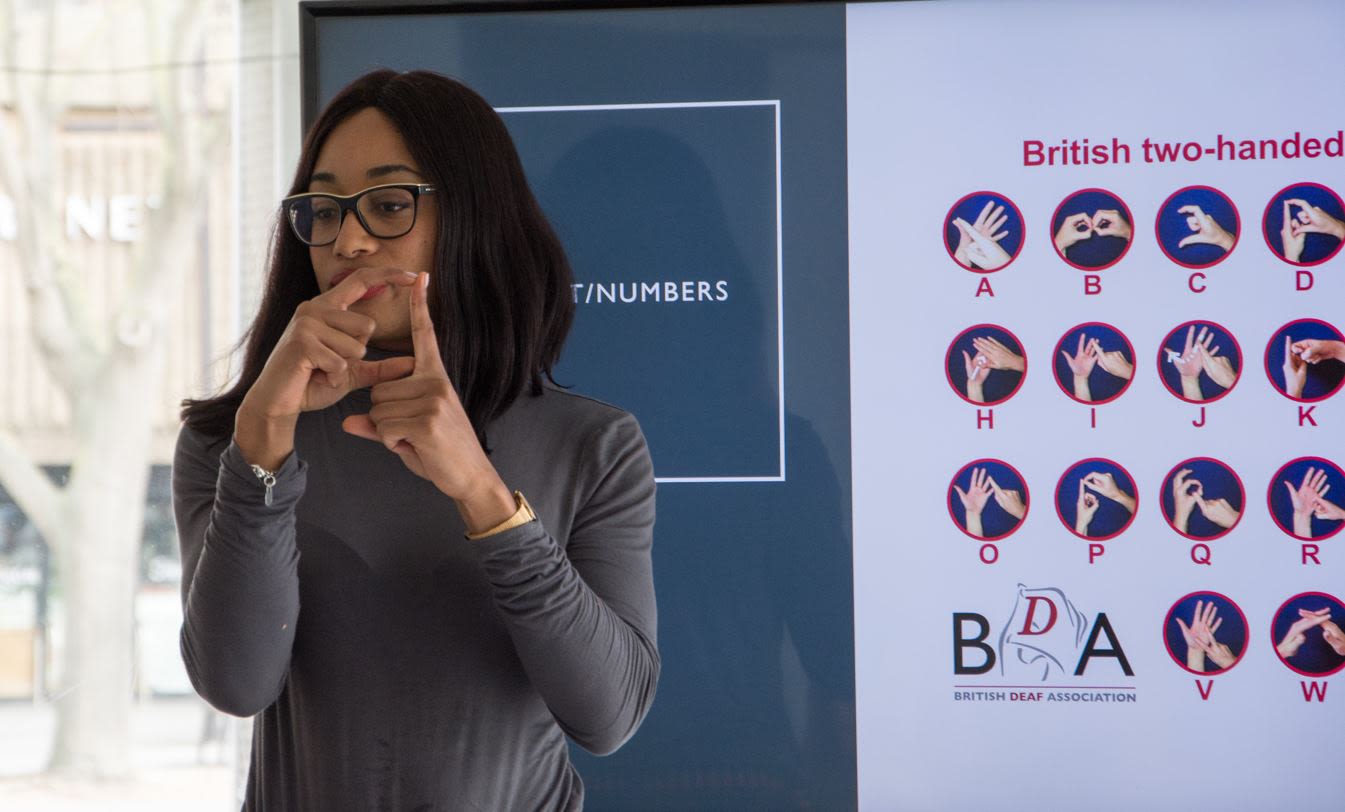Black History Month: Meet Sharifa Edwards raising deaf awareness at LCC

- Written byAnnika Loebig
- Published date 13 October 2022

As part of our Black History Month celebration, we interviewed Student Enquiries Administrator Sharifa Edwards, who is currently working on raising deaf awareness at LCC.
Get to know Sharifa and find out why acknowledging Black History is important to her.
Hi Sharifa! Can you tell us a little about who you are, both at UAL and beyond?
I was born in England - seasoned in Jamaica.
I'm a lover of live music, arts and galleries.
Although I was born in the UK, I had the privilege of being schooled in Kingston, Jamaica.
Both of my parents are musicians. My mother plays trumpet and piano. My father has transitioned now but when he was alive, he was deeply connected with the reggae industry, played guitar and had celebrities visiting him regularly on their UK visits, like Freddie McGregor.
During working hours, you can find me in the Information Centre and reception at LCC.
I can help you in many ways, from the regular College questions to other needs related to deaf awareness, communication skills and British Sign Language (BSL).
I have hearing loss and wear hearing aids. Being used to running workshops, I volunteered to be part of the staff development committee, then volunteered to do a BSL workshop.
On a more personal level outside the College, I volunteer for Black Deaf UK as a wellbeing advocate and do 30 minutes of exercise or meditation on a daily.
Could you please tell us more about how you're working with LCC to achieve greater deaf awareness?
Talking about deafness is awkward in itself but must not be avoided.
Not all disability is visible but deaf does not mean dumb. Talking about my own experiences, I have given other members of staff the opportunity and confidence to 'come out'.
I run Introduction to BSL and Deaf Awareness workshops that emphasise the beauty and richness in deaf culture and visual communications.
These workshops span from 1 to 2 hours, covering communication tips, basic BSL conversation skills and workplace vocabulary.
By the end of each workshop, all participants have great joy in learning how to introduce themselves and the area of work they do in another language.
I try to organise as many open workshops and seminars as possible to increase awareness in a variety of groups, such as working with new ambassadors who help welcome new students and Open Days staff.
I have also created playing cards and BSL posters that are displayed around LCC to help create Deaf Awareness.
How did the project come about, and what are you hoping to achieve?
When I started in 2019, I had zero expectations, but I knew that any outcome would be better than nothing, so the journey began. I offered to do a one-off Introduction to BSL session, which I now run regularly due to staff demands.
I am in the process of working with Arts Temps to produce a series of BSL videos targeted towards hearing people who would like to expand communication skills and deaf awareness.
Why do you think it's important to celebrate Black History Month?
It's an opportunity to remind us of the issues and disparity Black people currently face, an opportunity to spotlight and celebrate the achievements that Black people have accomplished in this country.
Everyday history is being made and we are living through it as well as shaping it which will have an impact on future generations and people's attitudes and values.
Black History Month is an opportunity for Black people to express their struggles and identify major gaps in the working world which still highlight the discrimination Black people are facing to this day. For example, African colleagues who change their name to something more English sounding to ‘fit in’.
These may be uncomfortable conversations to have but are extremely important to acknowledge and identify the steps that can be taken towards bridging the gap and removing the differences and opportunities Black people have.
What Black people have inspired you throughout your life and how?
That are so many that I would love to mention for their works, influence on me or only for their everyday inspirational survival stories. But I can't not talk about:
- My grandmother: Jamaican born and bred, definition of womanhood to me. She was a wife, mother, sister, niece: all the titles a woman can have, she had them! Taught me how to cook Jamaican dishes and recited traditional West Indian folklore to me as a child
- Rihanna: She is amazing because she can barely sing or dance, but has used her Caribbean sense of style, fashion and flair to surpass her peers, including white ones, and is a self-made billionaire.. she made accents sexy and is a NATIONAL HERO in Barbados!
Why is it important for UAL to acknowledge and celebrate the contributions of their Black staff, students and alumni?
Here at UAL, I am very happy to be part of this community that try in so many departments and courses to bring attention for the many under-celebrated Black people in a multitude of fields. Starting this conversation will make a small difference in this generation that will spread and ingrain on the ones to come.
As one of the best Universities with a huge number of international students and cultural diversity, Black people and minorities are celebrated and embraced in many different ways.
Are there any useful resources, websites etc that you would recommend?
Yes! I'd recommend:
The Black Blossoms School of Art and Culture (by a UAL alum)
Blacticulate (by a UAL student)